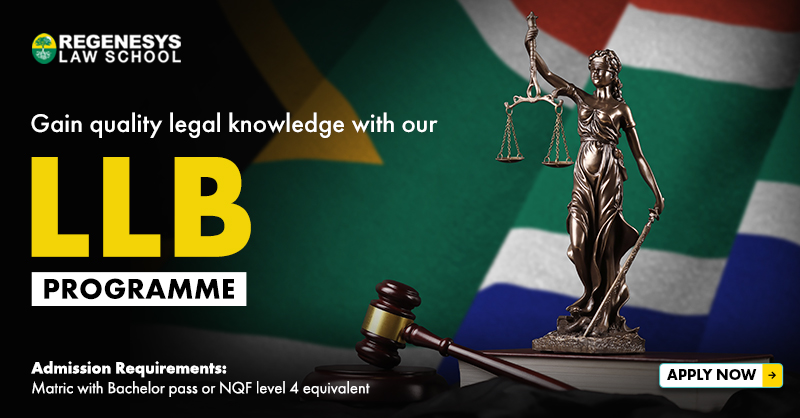Looking to study law in South Africa but unsure where to start? Choosing the right university is a key step in building a successful legal career. With so many options available, it can be confusing to understand which universities in South Africa offer the best law programmes and what the entry requirements are. If you want to study law in South Africa, it’s essential to know what each programme entails, the academic requirements, and how it aligns with your career goals.
In this article, we will explore universities in South Africa to study law, their requirements, the types of programmes offered, career opportunities, and how Regenesys Law School can help you start your journey in law.
Table of Contents
- Types of Law Degrees in South Africa
- Key Entrance Requirements to Study Law in South Africa
- Study Modes Available for Law Programmes
- Leading Universities in South Africa to Study Law
- Why Choose Regenesys Law School for Your LLB?
- Factors to Consider When Choosing a Law University
- Career Opportunities After Studying Law
- Conclusion
- Universities in South Africa to Study Law – FAQ
Types of Law Degrees in South Africa
When considering universities in South Africa to study law, it’s important to understand the different law degrees available. Choosing the right degree sets the foundation for your legal career and determines the pathway you will follow. The main law degrees include:
Here are the main types of law programmes offered:
- LLB (Bachelor of Laws) – The LLB is the standard law degree in South Africa, usually lasting four years. It provides a strong foundation in areas such as constitutional law, criminal law, and corporate law, preparing graduates for careers as attorneys, legal advisors, or compliance officers.
- BA Law or BCom Law – These undergraduate degrees combine law with arts or commerce subjects. Graduates often proceed to an LLB to practise law. They provide a broader view of how law interacts with business or humanities, useful for specialised career paths.
- Postgraduate Diplomas in Law – Shorter programmes focusing on specific areas such as tax, corporate, or environmental law. Ideal for graduates seeking specialised skills and career growth.
For those with an LLB, South Africa offers advanced degrees such as the LLM (Master of Laws) and LLD (Doctor of Laws). The LLM allows specialisation in areas like commercial or human rights law, while the LLD focuses on legal research for academic or high-level careers.
Read more on Types of Law Degrees Available in South Africa

Key Entrance Requirements to Study Law in South Africa
Before applying, it’s crucial to understand the university requirements to study law in South Africa. Knowing what is expected helps students prepare academically and increases their chances of being accepted into a law programme.
The following are common requirements for admission into universities in South Africa to study law:
- Academic Qualifications: Students typically need a National Senior Certificate (NSC) or equivalent, with a strong academic record.
- Subject Requirements: While there are no compulsory subjects across all universities, English proficiency and Mathematics or Mathematical Literacy are highly recommended.
- Additional Criteria: Some programmes may require motivation letters, interviews, or proof of prior learning for mature students.
Read more on Bachelor of Law Entry Requirements in South Africa: Your Guide for Starting a Legal Career
Study Modes Available for Law Programmes
When looking at universities in South Africa to study law, it’s important to consider how you want to complete your studies. Different study modes provide flexibility depending on your lifestyle, work commitments, and personal preferences.
Here are the main study modes available:
- Full-Time Study: Traditional, campus-based learning ideal for school leavers with time to focus fully on studies.
- Part-Time Study: Flexible schedules for working professionals or students balancing other responsibilities.
- Online Study: Remote learning that offers complete flexibility for those unable to attend campus.
Considering study modes is an essential step when evaluating universities in South Africa to study law.

Leading Universities in South Africa to Study Law
South Africa is home to some of the continent’s most reputable law faculties, offering a wide range of undergraduate and postgraduate programmes. Whether you want to pursue a traditional LLB, combine law with commerce or arts, or specialise at a postgraduate level, these universities provide accredited pathways into the legal profession. Below is a list of leading universities in South Africa to study law:
1. Regenesys Law School
- Offers a 4-year Bachelor of Laws (LLB) programme comprising 485 credits.
- Study Modes: Online and contact learning, designed for both full-time students and working professionals.
- Accreditation: Fully accredited by the Council on Higher Education (CHE) and registered with the South African Qualifications Authority (SAQA ID: 119076, NQF Level 8).
- Emphasis on practical learning through case studies, assignments, and research projects.
2. University of KwaZulu-Natal (UKZN), School of Law
- Offers LLB full-time and part-time programmes.
- Postgraduate Options: LLM degrees in areas such as Taxation, Environmental Law, Business Law, and Constitutional Litigation.
3. University of Cape Town (UCT), Faculty of Law
- Offers the LLB degree as well as postgraduate qualifications (LLM, MPhil, PhD, and Postgraduate Diplomas).
- Recognised internationally for research in constitutional, human rights, and commercial law.
4. University of the Witwatersrand (Wits University), School of Law
- Undergraduate Degrees: BA Law, BCom Law, and LLB.
- Postgraduate Degrees: PGDip, LLM, and PhD, with specialisations such as Commercial Law, Human Rights, and Environmental Law.
5. Stellenbosch University, Faculty of Law
- Offers LLB and postgraduate degrees such as LLM and Doctoral programmes.
- Known for world-class research output, including specialised research chairs in areas like Intellectual Property Law and Human Rights.
6. University of Pretoria (UP), Faculty of Law
- Undergraduate Pathways: LLB, BA Law, and BCom Law.
- Postgraduate Studies: Wide range of LLMs and LLDs across various legal specialisations.
Why Choose Regenesys Law School for Your LLB?
For students exploring universities in South Africa to study law, Regenesys Law School offers a forward-thinking and practical approach to legal education. The Bachelor of Laws (LLB) programme is designed not just to build strong theoretical foundations but also to prepare students for the realities of modern legal practice.
Here are some standout features of the Regenesys programmes:
- Practical Learning Approach: Innovative methods that mirror real-world legal practice.
- Advocacy Development: Opportunities to refine courtroom skills through moot court participation.
- Expert Lecturers: Guidance from leading academics and practising legal professionals.
- Career-Focused Studies: Specialisation options in areas like corporate, human rights, environmental, and technology law.
- Professional Network: Access to a wide alumni base for mentorship and career growth.
Read more on Exploring Regenesys Law School: A Pathway to a Legal Career!
Factors to Consider When Choosing a Law University
When deciding which universities in South Africa to study law, several factors can influence your choice. Considering these can help you select a programme that aligns with your career ambitions.
Here are key factors to keep in mind while exploring :
- Accreditation: Ensure the law programme is recognised by relevant legal councils and education authorities.
- Curriculum and Modules: Check whether the programme covers the areas of law you are interested in.
- Flexibility and Learning Mode: Determine if full-time, part-time, or online study suits your lifestyle.
- Career Support: Look for programmes that provide guidance on internships, practical exposure, and career planning.
Read more on Choosing the Right Path: Factors to Consider When Selecting a Law School in South Africa
Career Opportunities After Studying Law
A law degree in South Africa provides a versatile foundation that opens doors to a variety of rewarding career paths. Beyond traditional legal practice, studying law equips graduates with critical thinking, problem-solving, and analytical skills that are highly valued across multiple sectors. Understanding career opportunities helps students align their studies with long-term goals and choose suitable universities in South Africa to study law.
Here are some popular career paths for law graduates:
- Assistant Prosecution Officer: Supports prosecutors in preparing and managing criminal cases, gathering evidence, and assisting in court proceedings.
- Law Professor or Teacher: Educates future legal professionals in universities or colleges, contributing to legal research and academic scholarship.
- Legal Adviser: Provides expert guidance to companies, government institutions, or NGOs on legal matters, contracts, and compliance.
- Legal Assistant: Works alongside attorneys or law firms to manage documentation, conduct research, and support legal processes.
- Public Prosecutor: Represents the state in criminal cases, ensuring justice is served and upholding the legal system in courts.

Conclusion
Choosing the right universities in South Africa to study law is a crucial step in building a successful legal career. By understanding the different law degrees, study modes, entry requirements, and career opportunities, students can make an informed decision that aligns with their professional goals. A law qualification not only opens doors to traditional roles but also provides versatile skills valued across multiple sectors.
For those seeking a flexible and recognised pathway, Regenesys Law School offers an online LLB programme that combines academic rigour with practical learning. If you want to study law in South Africa, enrol in our programme today and take the first step towards a rewarding legal career.
Universities in South Africa to Study Law – FAQ
Can I study law online in South Africa?
Yes, Regenesys Law School offers an online LLB programme, allowing students to study law from anywhere in the country.
What are the subject requirements to study law?
English proficiency is essential, and Mathematics or Mathematical Literacy is recommended. Other subjects may vary depending on the programme.
Can mature learners apply for the LLB programme?
Yes, Regenesys Law School considers Recognition of Prior Learning (RPL) for students with relevant work experience.
What career opportunities are available after completing the LLB?
Graduates can pursue careers as attorneys, legal advisors, compliance officers, corporate law practitioners, or continue with specialised legal training.
Where can I study law in South Africa?
If you are searching for universities in South Africa to study law, there are several options available, including programmes that offer both online and contact learning. It is important to choose a recognised programme that aligns with your career goals.







